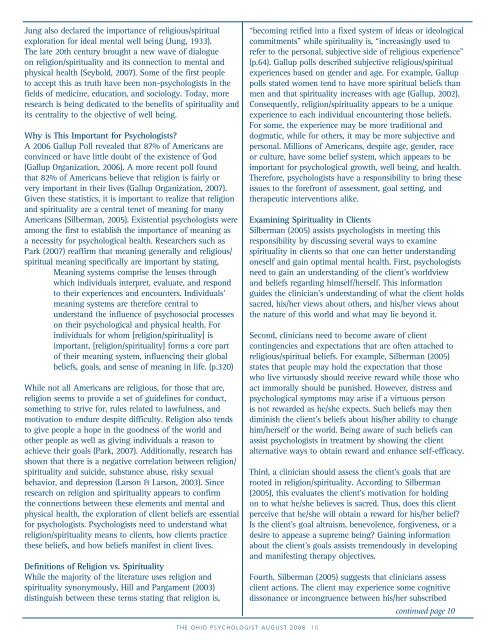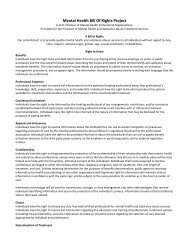2008 Ohio Psychologist - Ohio Psychological Association
2008 Ohio Psychologist - Ohio Psychological Association
2008 Ohio Psychologist - Ohio Psychological Association
Create successful ePaper yourself
Turn your PDF publications into a flip-book with our unique Google optimized e-Paper software.
Jung also declared the importance of religious/spiritual<br />
exploration for ideal mental well being (Jung, 1933).<br />
The late 20th century brought a new wave of dialogue<br />
on religion/spirituality and its connection to mental and<br />
physical health (Seybold, 2007). Some of the first people<br />
to accept this as truth have been non-psychologists in the<br />
fields of medicine, education, and sociology. Today, more<br />
research is being dedicated to the benefits of spirituality and<br />
its centrality to the objective of well being.<br />
Why is This Important for <strong>Psychologist</strong>s<br />
A 2006 Gallup Poll revealed that 87% of Americans are<br />
convinced or have little doubt of the existence of God<br />
(Gallup Organization, 2006). A more recent poll found<br />
that 82% of Americans believe that religion is fairly or<br />
very important in their lives (Gallup Organization, 2007).<br />
Given these statistics, it is important to realize that religion<br />
and spirituality are a central tenet of meaning for many<br />
Americans (Silberman, 2005). Existential psychologists were<br />
among the first to establish the importance of meaning as<br />
a necessity for psychological health. Researchers such as<br />
Park (2007) reaffirm that meaning generally and religious/<br />
spiritual meaning specifically are important by stating,<br />
Meaning systems comprise the lenses through<br />
which individuals interpret, evaluate, and respond<br />
to their experiences and encounters. Individuals’<br />
meaning systems are therefore central to<br />
understand the influence of psychosocial processes<br />
on their psychological and physical health. For<br />
individuals for whom [religion/spirituality] is<br />
important, [religion/spirituality] forms a core part<br />
of their meaning system, influencing their global<br />
beliefs, goals, and sense of meaning in life. (p.320)<br />
While not all Americans are religious, for those that are,<br />
religion seems to provide a set of guidelines for conduct,<br />
something to strive for, rules related to lawfulness, and<br />
motivation to endure despite difficulty. Religion also tends<br />
to give people a hope in the goodness of the world and<br />
other people as well as giving individuals a reason to<br />
achieve their goals (Park, 2007). Additionally, research has<br />
shown that there is a negative correlation between religion/<br />
spirituality and suicide, substance abuse, risky sexual<br />
behavior, and depression (Larson & Larson, 2003). Since<br />
research on religion and spirituality appears to confirm<br />
the connections between these elements and mental and<br />
physical health, the exploration of client beliefs are essential<br />
for psychologists. <strong>Psychologist</strong>s need to understand what<br />
religion/spirituality means to clients, how clients practice<br />
these beliefs, and how beliefs manifest in client lives.<br />
Definitions of Religion vs. Spirituality<br />
While the majority of the literature uses religion and<br />
spirituality synonymously, Hill and Pargament (2003)<br />
distinguish between these terms stating that religion is,<br />
“becoming reified into a fixed system of ideas or ideological<br />
commitments” while spirituality is, “increasingly used to<br />
refer to the personal, subjective side of religious experience”<br />
(p.64). Gallup polls described subjective religious/spiritual<br />
experiences based on gender and age. For example, Gallup<br />
polls stated women tend to have more spiritual beliefs than<br />
men and that spirituality increases with age (Gallup, 2002).<br />
Consequently, religion/spirituality appears to be a unique<br />
experience to each individual encountering those beliefs.<br />
For some, the experience may be more traditional and<br />
dogmatic, while for others, it may be more subjective and<br />
personal. Millions of Americans, despite age, gender, race<br />
or culture, have some belief system, which appears to be<br />
important for psychological growth, well being, and health.<br />
Therefore, psychologists have a responsibility to bring these<br />
issues to the forefront of assessment, goal setting, and<br />
therapeutic interventions alike.<br />
Examining Spirituality in Clients<br />
Silberman (2005) assists psychologists in meeting this<br />
responsibility by discussing several ways to examine<br />
spirituality in clients so that one can better understanding<br />
oneself and gain optimal mental health. First, psychologists<br />
need to gain an understanding of the client’s worldview<br />
and beliefs regarding himself/herself. This information<br />
guides the clinician’s understanding of what the client holds<br />
sacred, his/her views about others, and his/her views about<br />
the nature of this world and what may lie beyond it.<br />
Second, clinicians need to become aware of client<br />
contingencies and expectations that are often attached to<br />
religious/spiritual beliefs. For example, Silberman (2005)<br />
states that people may hold the expectation that those<br />
who live virtuously should receive reward while those who<br />
act immorally should be punished. However, distress and<br />
psychological symptoms may arise if a virtuous person<br />
is not rewarded as he/she expects. Such beliefs may then<br />
diminish the client’s beliefs about his/her ability to change<br />
him/herself or the world. Being aware of such beliefs can<br />
assist psychologists in treatment by showing the client<br />
alternative ways to obtain reward and enhance self-efficacy.<br />
Third, a clinician should assess the client’s goals that are<br />
rooted in religion/spirituality. According to Silberman<br />
(2005), this evaluates the client’s motivation for holding<br />
on to what he/she believes is sacred. Thus, does this client<br />
perceive that he/she will obtain a reward for his/her belief<br />
Is the client’s goal altruism, benevolence, forgiveness, or a<br />
desire to appease a supreme being Gaining information<br />
about the client’s goals assists tremendously in developing<br />
and manifesting therapy objectives.<br />
Fourth, Silberman (2005) suggests that clinicians assess<br />
client actions. The client may experience some cognitive<br />
dissonance or incongruence between his/her subscribed<br />
continued page 10<br />
THE OHIO PSYCHOLOGIST AUGUST <strong>2008</strong> 10











